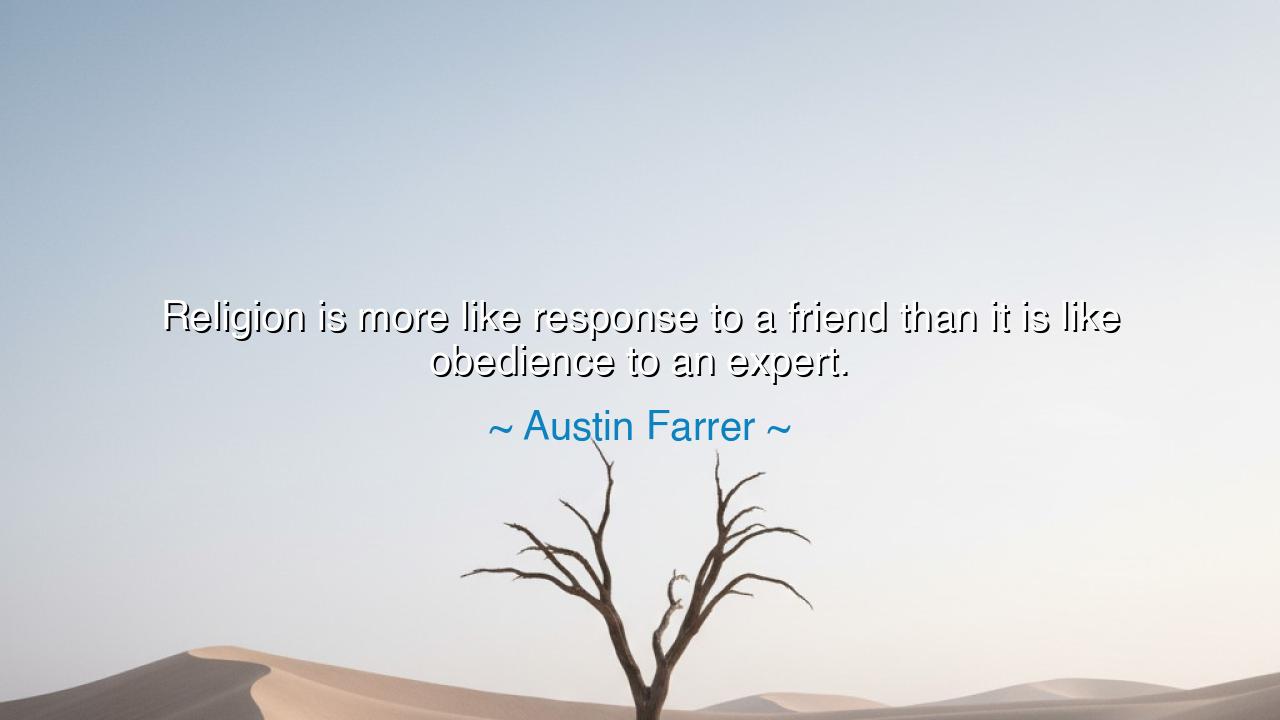
Religion is more like response to a friend than it is like






“Religion is more like response to a friend than it is like obedience to an expert.” Thus spoke Austin Farrer, the English philosopher-theologian, whose wisdom bridged the chasm between faith and reason. In these simple yet radiant words, Farrer sought to remind humankind that the essence of religion lies not in servitude or fear, but in relationship — that the divine is not a tyrant to be obeyed, but a friend to be loved. His insight lifts the soul out of cold ritual and returns it to warmth, to intimacy, to the trembling beauty of communion between Creator and creature.
Farrer lived in the twentieth century, a time when faith was often dissected by scholars and dismissed by skeptics. To many, religion had become a system — a machine of doctrines, hierarchies, and rules. But Farrer saw beyond the machinery to the beating heart beneath it. He reminded us that faith is not a science of precision, nor a philosophy of control. It is the response of love to a voice that calls across the silence. Like a friend reaching out, God does not demand technical obedience, but trust, conversation, and mutual presence.
To understand this, imagine a child speaking with a beloved parent. The child does not follow the parent’s words out of fear, but from affection — from the knowledge that the one who speaks loves him first. So too, in Farrer’s vision, the soul responds to God as a friend responds to a friend: not out of compulsion, but from the overflowing of gratitude and trust. To see religion as mere obedience is to reduce it to mechanics; to see it as friendship is to awaken its life, its tenderness, its sacred joy.
Consider the story of Francis of Assisi, the saint who walked barefoot through fields and forests, calling the sun his brother and the moon his sister. He did not follow God as a fearful servant, but as a joyous companion. His prayers were not recitations, but conversations — laughter, tears, and love shared with the divine. When he kissed the leper’s wound, when he sang with birds, when he knelt before the poorest of men, it was not because a law commanded him to, but because friendship with God had opened his heart to the whole world. In Francis, Farrer’s truth comes alive: faith is not compliance; it is companionship.
This kind of relationship transforms the very nature of the soul. For when one treats God as an expert, faith becomes distant and transactional. One asks: “What must I do?” and “What is the rule?” But when one treats God as a friend, faith becomes intimate and living. One asks instead: “Who art Thou?” and “How may I love Thee more?” It ceases to be about correctness and becomes about connection. Prayer changes from duty to dialogue. Worship becomes a meeting of hearts. The believer no longer trembles beneath divine authority but rests joyfully in divine affection.
Yet this friendship is not without reverence. To call God “friend” does not make Him less holy — it makes His holiness more personal. The friend who shaped the stars is the same who listens to your smallest sigh. The same fire that created the sun burns in the heart that whispers your name. Farrer’s words invite us to step beyond fear and into this sacred friendship — to walk with God as Abraham did under the open sky, to wrestle with Him as Jacob did at the river, to love Him as Mary did at the cross.
So, O seeker of the eternal, learn this lesson well: true religion is not built upon command, but upon communion. It is not the trembling of slaves before an expert judge, but the song of lovers who have found one another across eternity. Therefore, speak to God as to a friend — with honesty, with humility, with affection. Bring your joy and your sorrow, your triumphs and your failings, and know that He desires not perfection, but presence.
For in the end, as Austin Farrer knew, faith is a friendship — a sacred conversation that never ends. And if you nurture that friendship with prayer, kindness, and awe, you will discover that the divine no longer dwells in the distance of heaven, but in the quiet chambers of your own heart. Then, and only then, will you understand that religion was never meant to be obedience to an expert, but the eternal response to a Friend who has loved you first.






AAdministratorAdministrator
Welcome, honored guests. Please leave a comment, we will respond soon